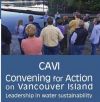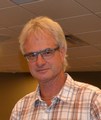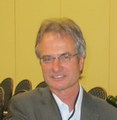Georgia Basin IREI Deliverable: 6th in Beyond the Guidebook Primer Series explains how to apply ecosystem-based understanding to achieve “Sustainable Watershed Systems”

“Implementation of ‘whole systems’ thinking would include incorporating the benefits provided by nature into the delivery of local government services,” stated Peter Law. “Community-based Environmental Stewardship has been an institution in BC for a generation. Today, community organizations partner with local governments to monitor and restore local watershed health. These groups provide thousands of volunteer hours to restore aquatic habitats,” stated Peter Law.
2016 Annual General Meeting of Mid Vancouver Island Habitat Enhancement Society – event of record for launch of "Primer on Sustainable Watershed Systems"

Local governments are starting to recognize that watersheds are natural assets that have value, ecosystem services have a role in municipal service delivery, and so they need to be integrated into their asset management programs. “The MVIHES experience demonstrates that positive outcomes are a result of strong community support for protection of small streams and their tributaries,” stated Faye Smith.
Brochure titled "Convening for Action on Vancouver Island: Leadership in water sustainability" explains CAVI mission

CAVI is an inclusive partnership, reaching out to audiences that share a vision of achieving water sustainability on Vancouver Island. CAVI is a grassroots, collective partnership committed to achieving settlement change in balance with ecology, beginning with water-centric planning. The CAVI vision is that by 2010, Vancouver Island will be well on its way to achieving water sustainabilty.
The Journey to Balance Economy, Ecology and Settlement on Vancouver Island

“Water sustainability became a common thread in discussions and decisions about land development, water use and water conservation. Participants from governments, the development community, academia, consulting organizations, and others, understand the importance of water sustainability and incorporate water sustainability practices into their activities. Water-centric thinking, planning and doing have become more than a vision. They are a reality on Vancouver Island,” wrote John FInnie.
Feast AND Famine, Flood AND Drought: How are Local Governments Responding in British Columbia?

“Recurring region-wide consequences of water-related challenges have prompted regional action to develop governance structures and processes to make the connections between high-level decision making and actions on the ground,” stated Keith Lawrence. “One of the actions undertaken throughout 2015 was a more coordinated approach to communicating what is happening in our region, and what can we do about climate impacts.”
CONVENING FOR ACTION ON VANCOUVER ISLAND: In May 2016, on the 10th anniversary of the first Meeting of the Minds forum that was held in Parksville, past-Chairs Derek Richmond (2011-2016) and John Finnie (2006-2011) announced that the CAVI initiative would be moving forward under a new name – “The Partnership on Vancouver Island: Leadership in Water Sustainability”

“We set a goal that Vancouver Island would be well on its way to water sustainability by 2010. For the past decade, CAVI has successfully promoted the message of water sustainability by engaging governments, developers and the community in water-centric thinking, planning and development activities. We exceeded our own expectations. Water sustainability became a common thread in discussions and decisions about land development, water use and water conservation,” stated John Finnie.
“CAVI – Leadership in Water Sustainability” is a program initiative on Vancouver Island, delivered under the umbrella of the Water Sustainability Action Plan for British Columbia

“We primarily work in the local government context, with a focus on community and regional planning systems, to influence uptake of strategies that will integrate decisions about use and conservation of land with water and watershed sustainability outcomes. The guiding philosophy is ‘design with nature’,” stated Tim Pringle. The Partnership brings together local governments, regulators, the stewardship community and business to address shared issues with consistent, workable solutions.
CONVENING FOR ACTION ON FRESH WATER SUSTAINABILITY: City of Courtenay’s Derek Richmond succeeded John Finnie as CAVI Chair (October 2011)

“Back in 2008, we knew that the key to moving forward was thinking beyond our boundaries, and making a real commitment to communicate, cooperate, coordinate and collaborate. Fast forward to October 2011. Our focus is on action so that we can implement strategies and practices at a watershed scale,” stated Derek Richmond. The handing of the baton from John Finnie to Derek Richmond was done at the “CAVI Forum within the Summit” at the 2011 State of the Island Economic Summit in Nanaimo.
CONVENING FOR ACTION ON FRESH WATER SUSTAINABILITY: After 5 years of providing stellar leadership, the RDN’s John Finnie stepped down as CAVI Chair in October 2011

“CAVI started on its path in 2005, with a gathering of people who recognized the importance of water sustainability in just about everything we do, whether it be do-to-day living or economic development. By 2006 that initial gathering had evolved into Convening for Acting on Vancouver Island: Leadership for Water Sustainability. CAVI envisions development carried out in a manner that harmonizes the footprint within the watershed to achieve water sustainability as an integral component of land development,” reflected John Finnie.
CONVENING FOR ACTION ON VANCOUVER ISLAND: CAVI story captured in "Beyond the Guidebook 2010: Implementing a New Culture for Urban Watershed Protection and Restoration in British Columbia"

“In 2005, the Action Plan partners launched a ‘made in BC’ process known as Convening for Action. When we gather, it is for a purpose. There must be an action item or an outcome. Beyond the Guidebook 2010 is the telling of the stories of how change is being implemented on the ground by local governments and community partners.The CAVI story in particular demonstrates how the practitioner culture is changing on Vancouver Island as an outcome of collaboration, partnerships and alignment,” stated John Finnie.

